Tsering Wangmo Dhompa Quotes & Sayings
Enjoy the top 26 famous quotes, sayings and quotations by Tsering Wangmo Dhompa.
Famous Quotes By Tsering Wangmo Dhompa
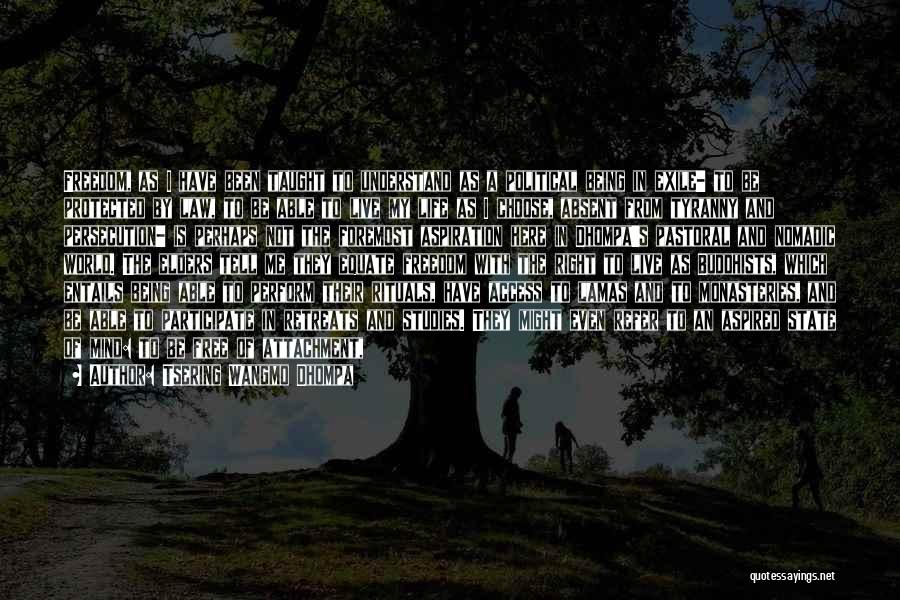
Freedom, as I have been taught to understand as a political being in exile- to be protected by law, to be able to live my life as I choose, absent from tyranny and persecution- is perhaps not the foremost aspiration here in Dhompa's pastoral and nomadic world. The elders tell me they equate freedom with the right to live as Buddhists, which entails being able to perform their rituals, have access to lamas and to monasteries, and be able to participate in retreats and studies. They might even refer to an aspired state of mind: to be free of attachment, anger, stupidity, jealousy and arrogance. To be released from fear and, perhaps, even from their attachment to the past. — Tsering Wangmo Dhompa
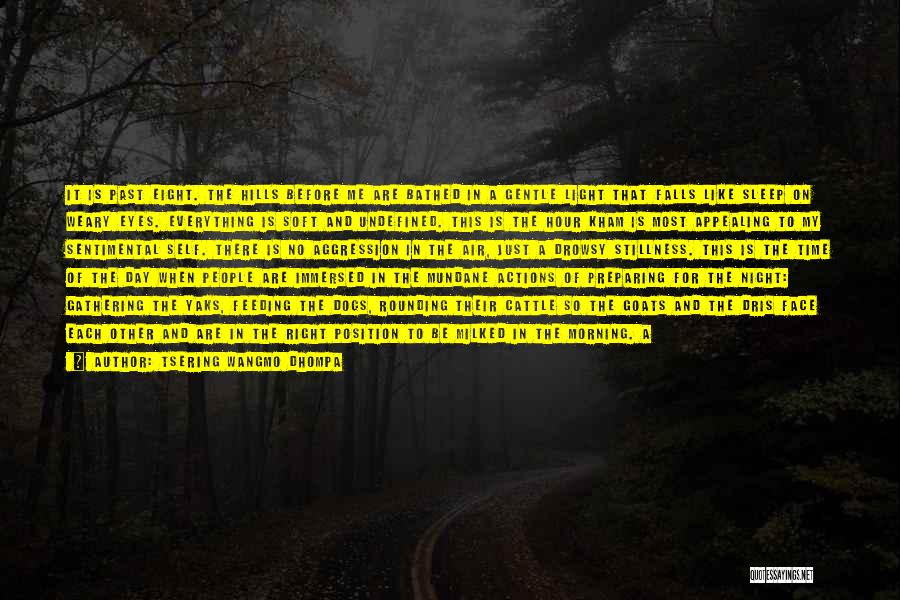
It is past eight. The hills before me are bathed in a gentle light that falls like sleep on weary eyes. Everything is soft and undefined. This is the hour Kham is most appealing to my sentimental self. There is no aggression in the air, just a drowsy stillness. This is the time of the day when people are immersed in the mundane actions of preparing for the night: gathering the yaks, feeding the dogs, rounding their cattle so the goats and the dris face each other and are in the right position to be milked in the morning. A time when the decisions made are whether people should take their clothes off or lie in them. A time when night is already evident in the way people light candles. — Tsering Wangmo Dhompa
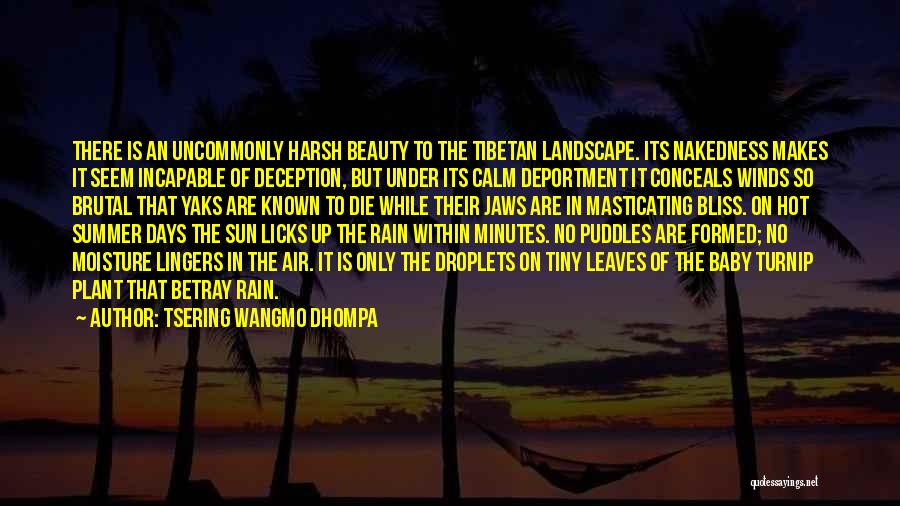
There is an uncommonly harsh beauty to the Tibetan landscape. Its nakedness makes it seem incapable of deception, but under its calm deportment it conceals winds so brutal that yaks are known to die while their jaws are in masticating bliss. On hot summer days the sun licks up the rain within minutes. No puddles are formed; no moisture lingers in the air. It is only the droplets on tiny leaves of the baby turnip plant that betray rain. — Tsering Wangmo Dhompa
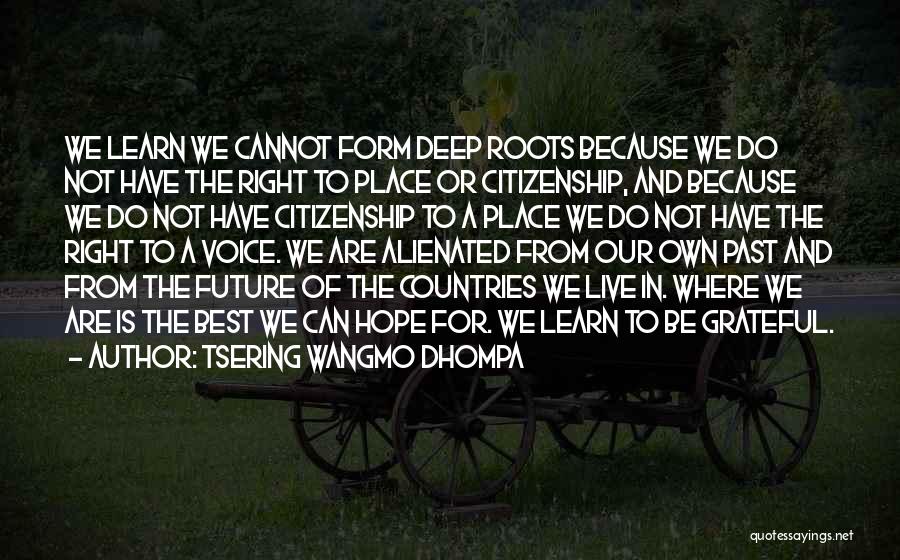
We learn we cannot form deep roots because we do not have the right to place or citizenship, and because we do not have citizenship to a place we do not have the right to a voice. We are alienated from our own past and from the future of the countries we live in. Where we are is the best we can hope for. We learn to be grateful. — Tsering Wangmo Dhompa
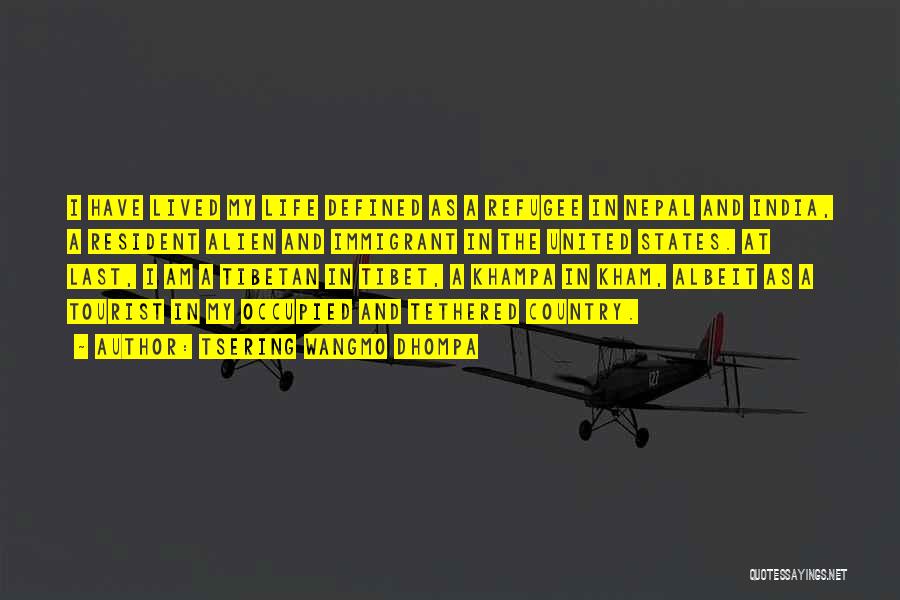
I have lived my life defined as a refugee in Nepal and India, a resident alien and immigrant in the United States. At last, I am a Tibetan in Tibet, a Khampa in Kham, albeit as a tourist in my occupied and tethered country. — Tsering Wangmo Dhompa
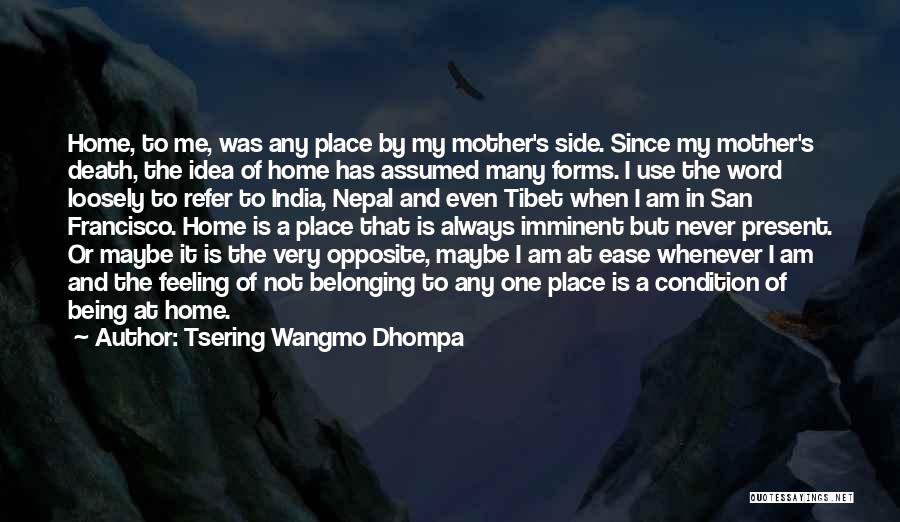
Home, to me, was any place by my mother's side. Since my mother's death, the idea of home has assumed many forms. I use the word loosely to refer to India, Nepal and even Tibet when I am in San Francisco. Home is a place that is always imminent but never present. Or maybe it is the very opposite, maybe I am at ease whenever I am and the feeling of not belonging to any one place is a condition of being at home. — Tsering Wangmo Dhompa
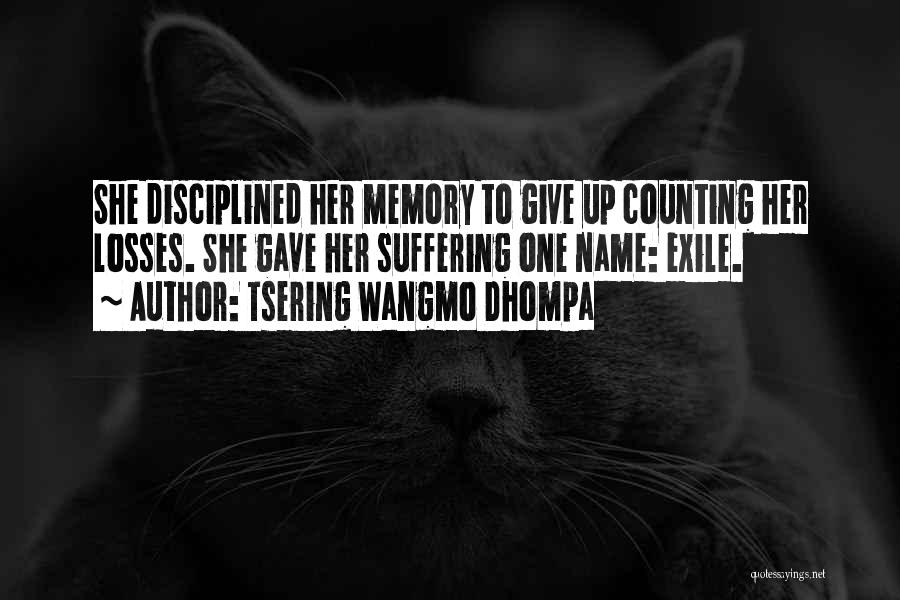
She disciplined her memory to give up counting her losses. She gave her suffering one name: exile. — Tsering Wangmo Dhompa
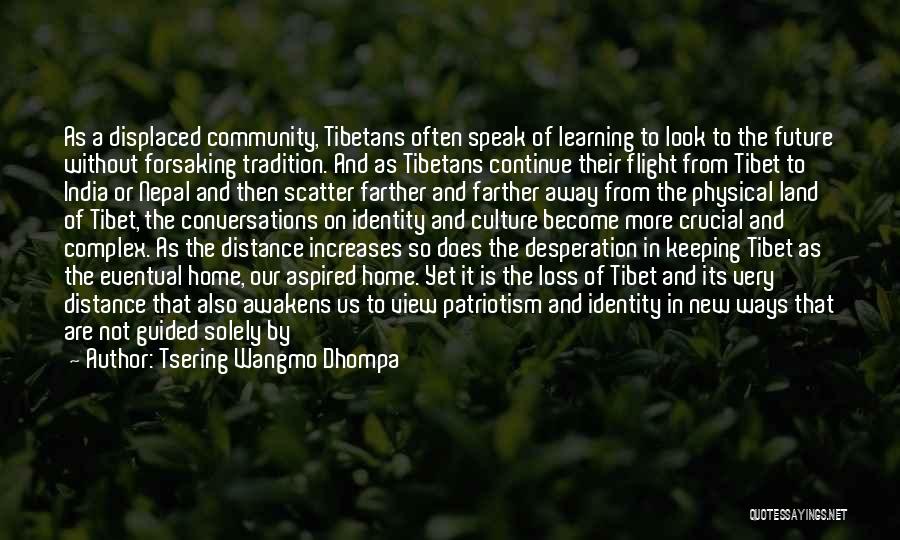
As a displaced community, Tibetans often speak of learning to look to the future without forsaking tradition. And as Tibetans continue their flight from Tibet to India or Nepal and then scatter farther and farther away from the physical land of Tibet, the conversations on identity and culture become more crucial and complex. As the distance increases so does the desperation in keeping Tibet as the eventual home, our aspired home. Yet it is the loss of Tibet and its very distance that also awakens us to view patriotism and identity in new ways that are not guided solely by Buddhist philosophy. Self-assertion- an approach avoided in the past because of the Buddhist aspiration to prevent focus on the self- enters our identity as Tibetans. — Tsering Wangmo Dhompa
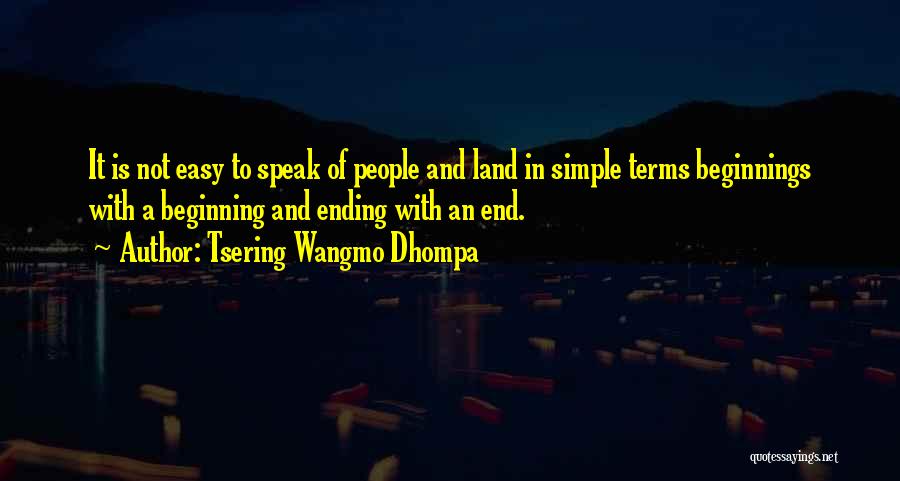
It is not easy to speak of people and land in simple terms beginnings with a beginning and ending with an end. — Tsering Wangmo Dhompa
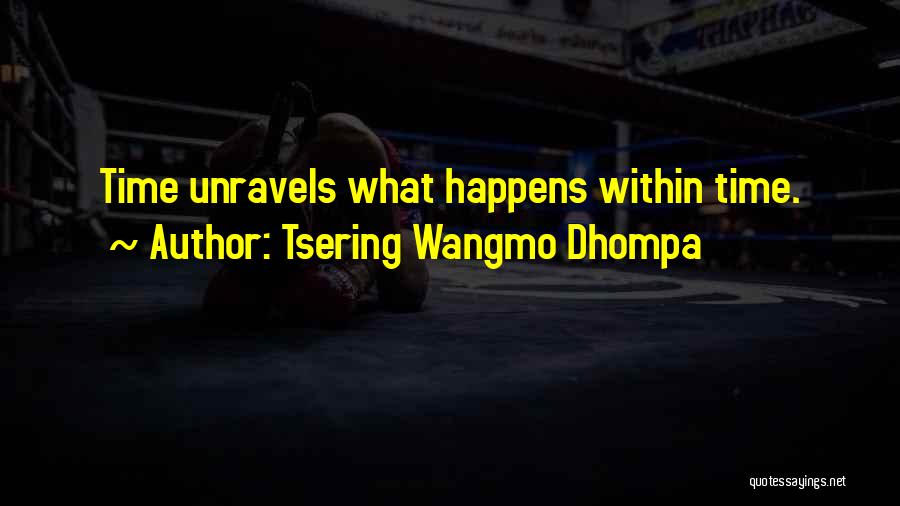
Time unravels what happens within time. — Tsering Wangmo Dhompa
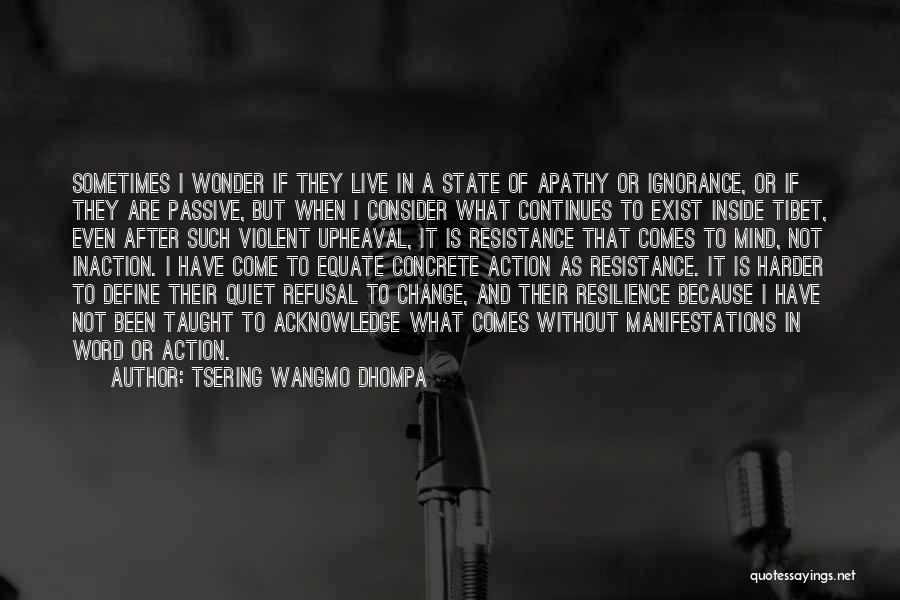
Sometimes I wonder if they live in a state of apathy or ignorance, or if they are passive, but when I consider what continues to exist inside Tibet, even after such violent upheaval, it is resistance that comes to mind, not inaction. I have come to equate concrete action as resistance. It is harder to define their quiet refusal to change, and their resilience because I have not been taught to acknowledge what comes without manifestations in word or action. — Tsering Wangmo Dhompa
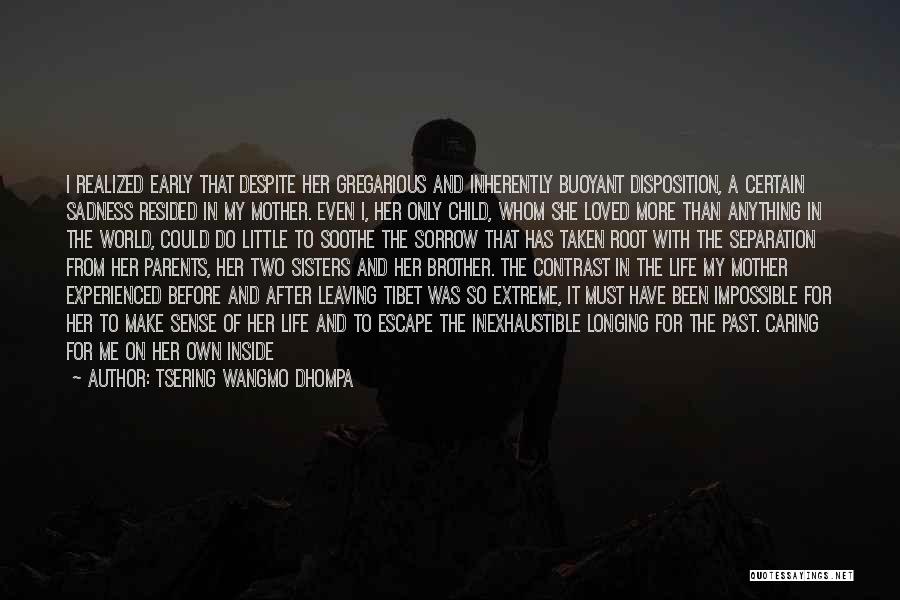
I realized early that despite her gregarious and inherently buoyant disposition, a certain sadness resided in my mother. Even I, her only child, whom she loved more than anything in the world, could do little to soothe the sorrow that has taken root with the separation from her parents, her two sisters and her brother. The contrast in the life my mother experienced before and after leaving Tibet was so extreme, it must have been impossible for her to make sense of her life and to escape the inexhaustible longing for the past. Caring for me on her own inside crowded rooms of tenement buildings in towns and cities, she must have felt she had dreamt her past or that she was dreaming her present existence. The places and residences we lived in were never quite home to her and led her to cling, more tenaciously, to the past. My mother had guarded her past sorrows from me because she knew me well enough to sense I would carry her grief as my own. — Tsering Wangmo Dhompa
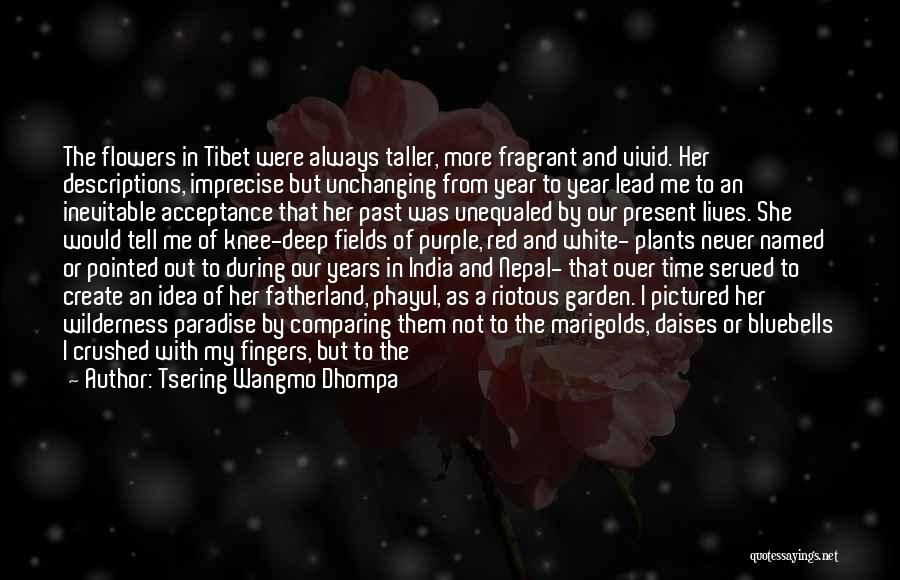
The flowers in Tibet were always taller, more fragrant and vivid. Her descriptions, imprecise but unchanging from year to year lead me to an inevitable acceptance that her past was unequaled by our present lives. She would tell me of knee-deep fields of purple, red and white- plants never named or pointed out to during our years in India and Nepal- that over time served to create an idea of her fatherland, phayul, as a riotous garden. I pictured her wilderness paradise by comparing them not to the marigolds, daises or bluebells I crushed with my fingers, but to the shape of household artefacts around me: lollipop, broom, bottle. Disparate objects that surrendered to and influenced the idea, space and hope of a more abundant and happy place. — Tsering Wangmo Dhompa
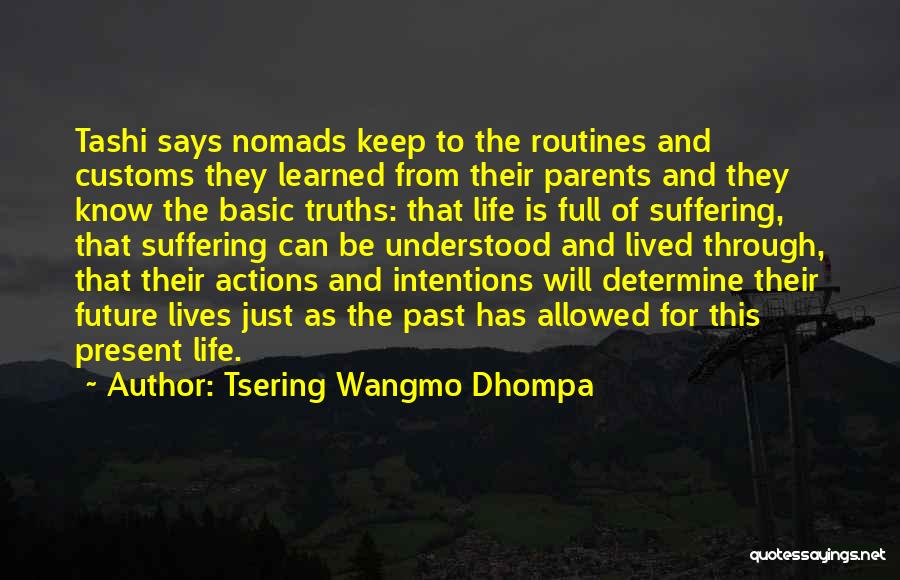
Tashi says nomads keep to the routines and customs they learned from their parents and they know the basic truths: that life is full of suffering, that suffering can be understood and lived through, that their actions and intentions will determine their future lives just as the past has allowed for this present life. — Tsering Wangmo Dhompa

How is it possible to protect your loved ones from old heartaches? — Tsering Wangmo Dhompa
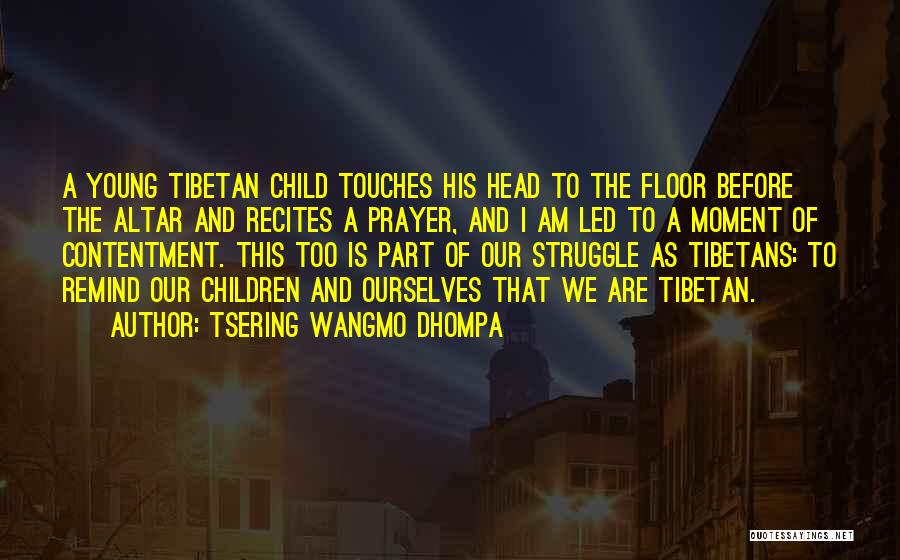
A young Tibetan child touches his head to the floor before the altar and recites a prayer, and I am led to a moment of contentment. This too is part of our struggle as Tibetans: to remind our children and ourselves that we are Tibetan. — Tsering Wangmo Dhompa
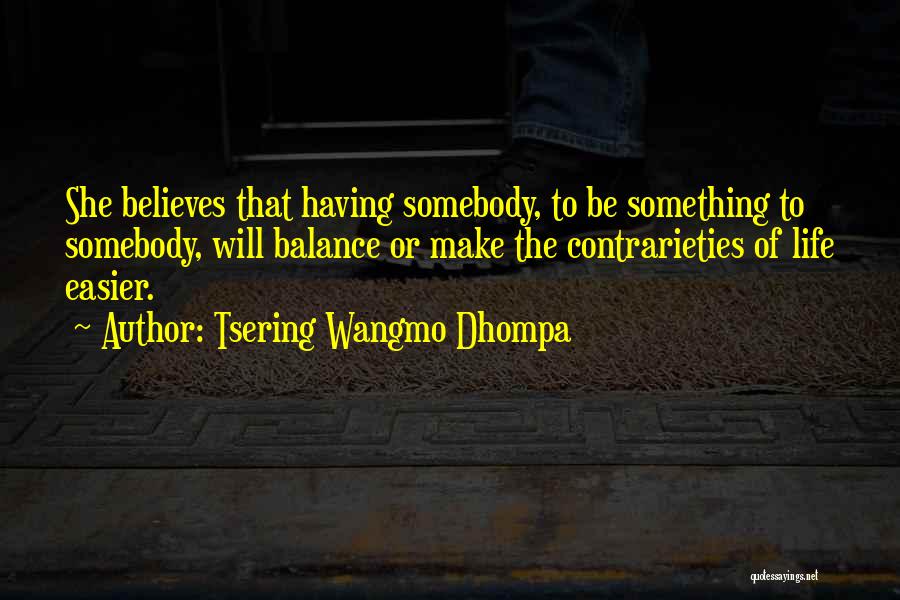
She believes that having somebody, to be something to somebody, will balance or make the contrarieties of life easier. — Tsering Wangmo Dhompa

When I am with my mother's people, I realize I have a lot to unlearn. I look to them to uncomplicated my notions of Tibet and Tibetans. They know where they are from; they live on the land. This assurance does not come in the same way to those of us in exile who experience a lack of certainty for is it not from the land that we get a sense of stability? Those of us born in exile inherit Tibet by inhabiting the memories of our elders. — Tsering Wangmo Dhompa
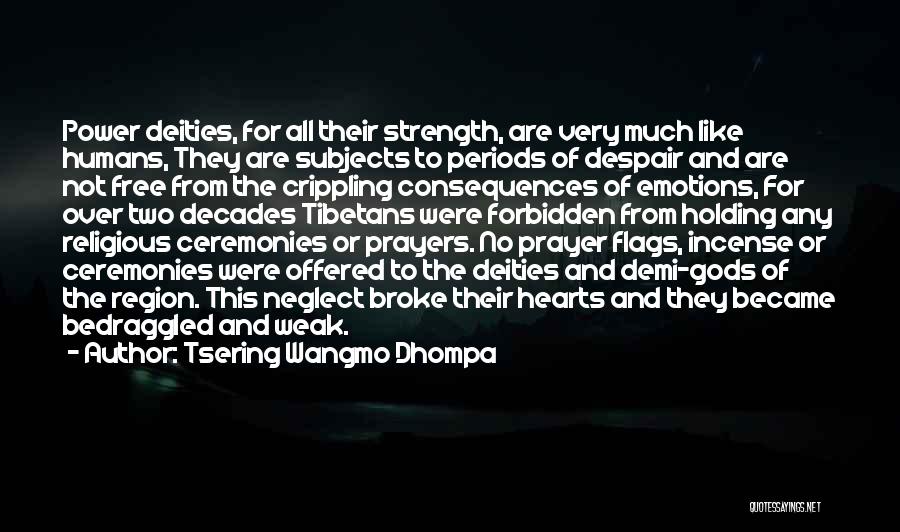
Power deities, for all their strength, are very much like humans, They are subjects to periods of despair and are not free from the crippling consequences of emotions, For over two decades Tibetans were forbidden from holding any religious ceremonies or prayers. No prayer flags, incense or ceremonies were offered to the deities and demi-gods of the region. This neglect broke their hearts and they became bedraggled and weak. — Tsering Wangmo Dhompa
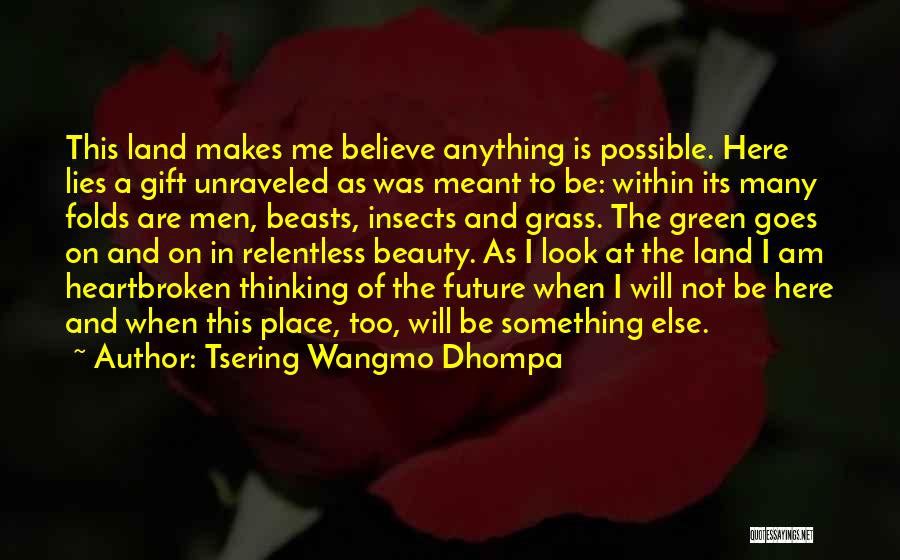
This land makes me believe anything is possible. Here lies a gift unraveled as was meant to be: within its many folds are men, beasts, insects and grass. The green goes on and on in relentless beauty. As I look at the land I am heartbroken thinking of the future when I will not be here and when this place, too, will be something else. — Tsering Wangmo Dhompa
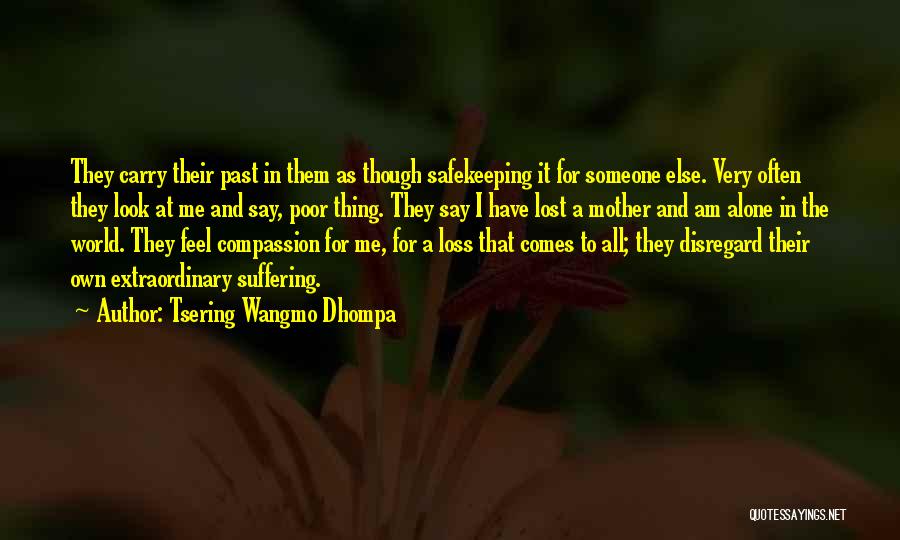
They carry their past in them as though safekeeping it for someone else. Very often they look at me and say, poor thing. They say I have lost a mother and am alone in the world. They feel compassion for me, for a loss that comes to all; they disregard their own extraordinary suffering. — Tsering Wangmo Dhompa
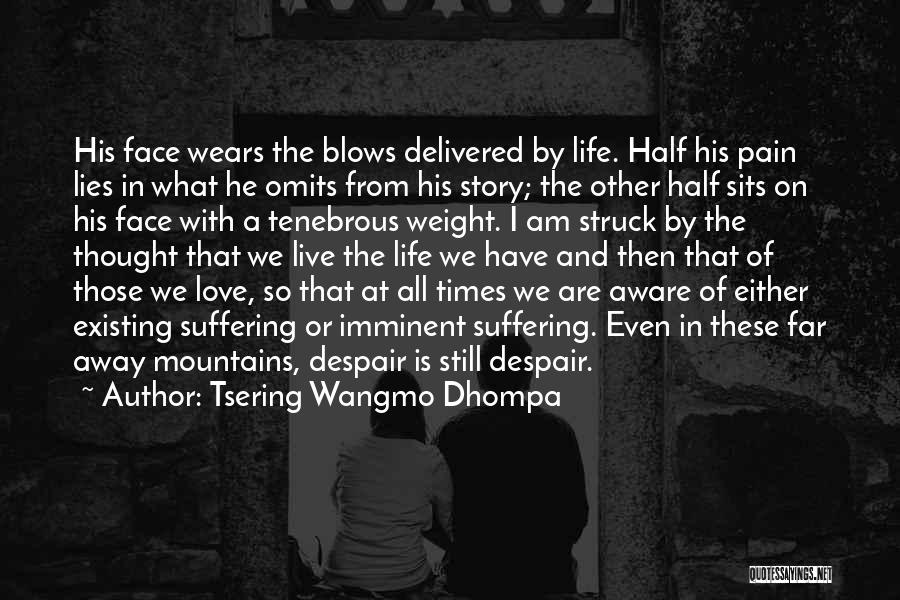
His face wears the blows delivered by life. Half his pain lies in what he omits from his story; the other half sits on his face with a tenebrous weight. I am struck by the thought that we live the life we have and then that of those we love, so that at all times we are aware of either existing suffering or imminent suffering. Even in these far away mountains, despair is still despair. — Tsering Wangmo Dhompa
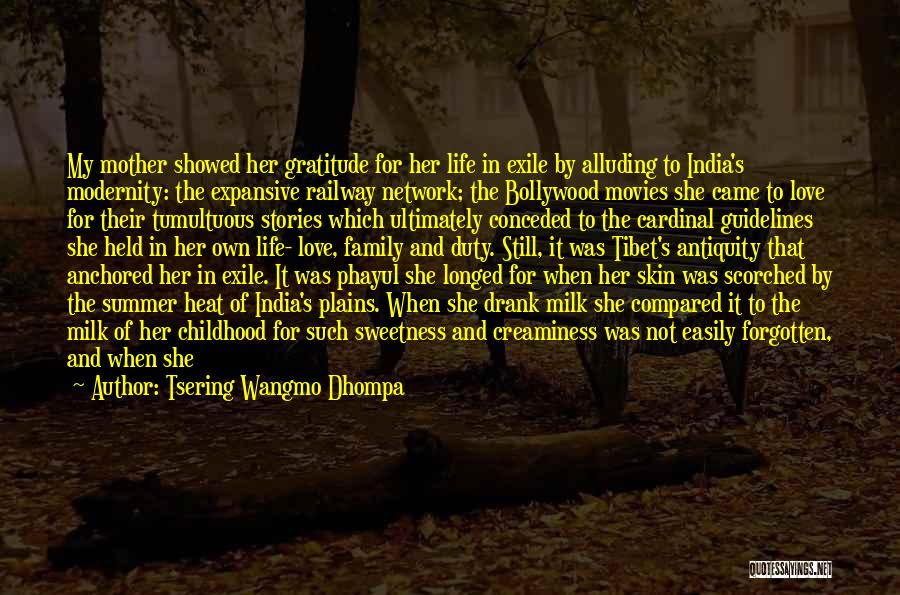
My mother showed her gratitude for her life in exile by alluding to India's modernity: the expansive railway network; the Bollywood movies she came to love for their tumultuous stories which ultimately conceded to the cardinal guidelines she held in her own life- love, family and duty. Still, it was Tibet's antiquity that anchored her in exile. It was phayul she longed for when her skin was scorched by the summer heat of India's plains. When she drank milk she compared it to the milk of her childhood for such sweetness and creaminess was not easily forgotten, and when she felt nauseous riding the buses that weaved their way around curvaceous mountain roads she spoke of the horses she had loved to ride. — Tsering Wangmo Dhompa
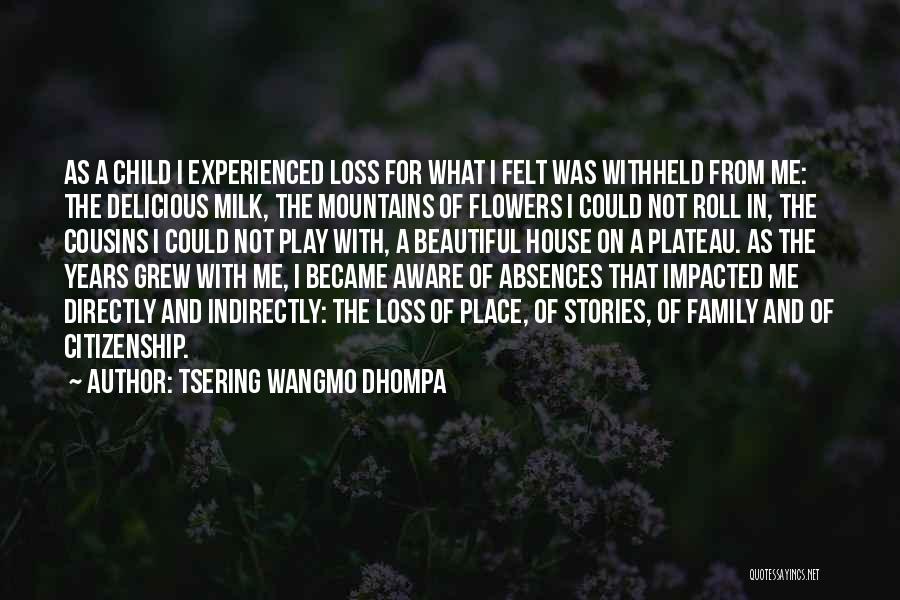
As a child I experienced loss for what I felt was withheld from me: the delicious milk, the mountains of flowers I could not roll in, the cousins I could not play with, a beautiful house on a plateau. As the years grew with me, I became aware of absences that impacted me directly and indirectly: the loss of place, of stories, of family and of citizenship. — Tsering Wangmo Dhompa
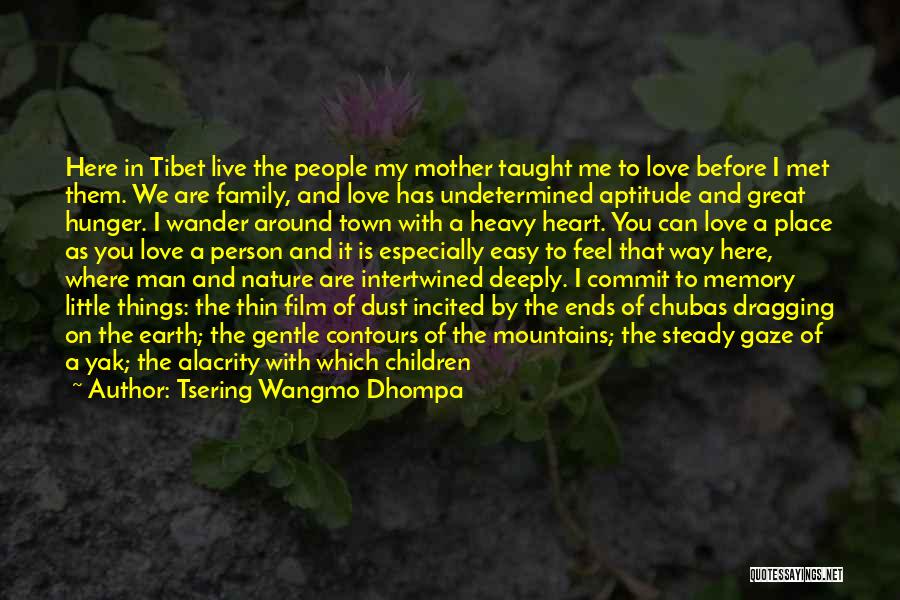
Here in Tibet live the people my mother taught me to love before I met them. We are family, and love has undetermined aptitude and great hunger. I wander around town with a heavy heart. You can love a place as you love a person and it is especially easy to feel that way here, where man and nature are intertwined deeply. I commit to memory little things: the thin film of dust incited by the ends of chubas dragging on the earth; the gentle contours of the mountains; the steady gaze of a yak; the alacrity with which children submit to authority; the patience of women who sit in the main square with bottles of milk and yogurt for sale; the songs on the streets. — Tsering Wangmo Dhompa
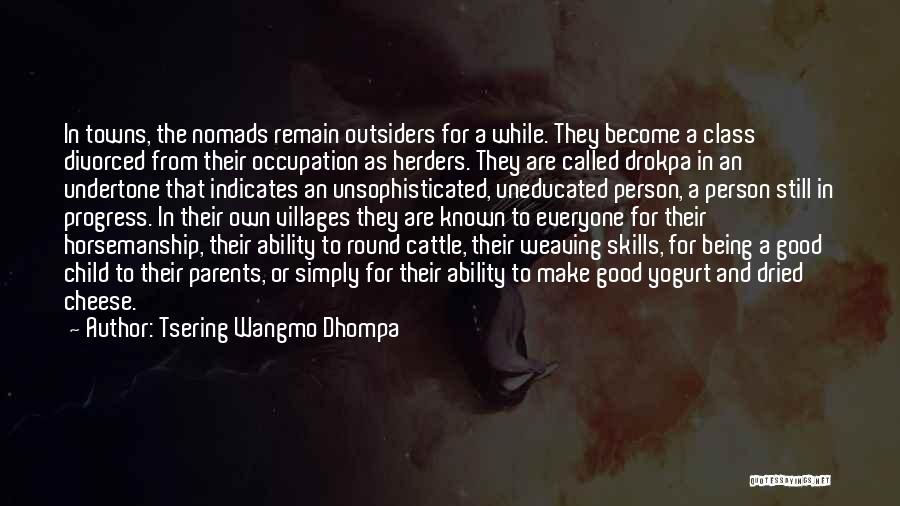
In towns, the nomads remain outsiders for a while. They become a class divorced from their occupation as herders. They are called drokpa in an undertone that indicates an unsophisticated, uneducated person, a person still in progress. In their own villages they are known to everyone for their horsemanship, their ability to round cattle, their weaving skills, for being a good child to their parents, or simply for their ability to make good yogurt and dried cheese. — Tsering Wangmo Dhompa





